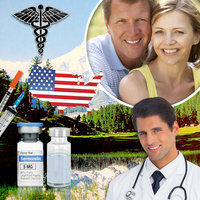Introduction
Prostate health is a critical concern for American males, with conditions such as prostate cancer and benign prostatic hyperplasia (BPH) affecting millions. Recent research has begun to shed light on a potential environmental factor that may contribute to these conditions: exposure to pesticides. This article explores the relationship between pesticide exposure and prostate health, offering insights into how American males can protect themselves.
The Link Between Pesticides and Prostate Health
Emerging studies suggest a concerning association between pesticide exposure and prostate health. Pesticides, commonly used in agriculture and household pest control, contain chemicals that can disrupt the endocrine system. This disruption can lead to hormonal imbalances, which are implicated in the development of prostate diseases. For instance, a study published in the *Journal of the National Cancer Institute* found that men with high exposure to certain pesticides had a significantly increased risk of developing aggressive prostate cancer.
Mechanisms of Pesticide Impact
Pesticides can affect prostate health through several mechanisms. One primary pathway is through the disruption of androgen signaling. Androgens, such as testosterone, play a crucial role in prostate function and growth. Pesticides like organophosphates and organochlorines can mimic or inhibit these hormones, leading to abnormal cell proliferation and potentially cancerous growths. Additionally, pesticides may cause oxidative stress and DNA damage, further increasing the risk of prostate diseases.
Occupational Exposure and Prostate Health
American males working in agriculture, pest control, and related industries are at a higher risk of pesticide exposure. These occupational hazards can lead to chronic exposure, which is particularly dangerous. A study from the *American Journal of Epidemiology* highlighted that farmers and pesticide applicators had a higher incidence of prostate cancer compared to the general population. This underscores the need for stringent safety measures and protective equipment in these professions.
Dietary Exposure and Consumer Risks
Beyond occupational exposure, American males can also encounter pesticides through their diet. Residues from pesticides used in farming can remain on fruits, vegetables, and other food products. While regulatory agencies set limits on these residues, long-term consumption can still pose health risks. Choosing organic produce and washing fruits and vegetables thoroughly can help reduce exposure. Additionally, being aware of the types of pesticides used in food production can empower consumers to make informed choices.
Preventive Measures and Recommendations
To mitigate the risks associated with pesticide exposure, American males can take several preventive measures. Firstly, using personal protective equipment (PPE) when handling pesticides is crucial. This includes gloves, masks, and protective clothing. Secondly, regular health screenings, particularly for those in high-risk occupations, can aid in early detection and treatment of prostate conditions. Lastly, adopting a diet rich in antioxidants and nutrients that support prostate health, such as lycopene found in tomatoes, can be beneficial.
Conclusion
The impact of pesticides on prostate health is a growing concern for American males. While more research is needed to fully understand the extent of this relationship, the current evidence suggests a need for caution and proactive measures. By understanding the risks and taking steps to minimize exposure, American males can better protect their prostate health and overall well-being. As awareness and research continue to evolve, it is essential for individuals and communities to stay informed and advocate for safer pesticide use and regulations.
Contact Us For A Fast And Professional Response

- Prostate Health in Aging Men: Understanding Changes and Managing Care [Last Updated On: March 13th, 2025] [Originally Added On: March 13th, 2025]
- Exercise: A Key to Enhancing Prostate Health in American Males [Last Updated On: March 17th, 2025] [Originally Added On: March 17th, 2025]
- Prostate Health: Diet, Exercise, Screening, and Lifestyle for American Men's Well-being [Last Updated On: March 19th, 2025] [Originally Added On: March 19th, 2025]
- Prostate Cancer Screening: Debates, Guidelines, and Personalized Recommendations for American Men [Last Updated On: March 20th, 2025] [Originally Added On: March 20th, 2025]
- Prostate Cancer's Psychological Impact on American Men: A Holistic Care Approach [Last Updated On: March 20th, 2025] [Originally Added On: March 20th, 2025]
- Dietary Strategies for Enhancing Prostate Health in American Men [Last Updated On: March 20th, 2025] [Originally Added On: March 20th, 2025]
- Navigating Prostate Cancer Survivorship: A Comprehensive Guide for American Men [Last Updated On: March 20th, 2025] [Originally Added On: March 20th, 2025]
- Prostate and Heart Health: Understanding the Link and Holistic Prevention Strategies [Last Updated On: March 21st, 2025] [Originally Added On: March 21st, 2025]
- Family History's Role in Prostate Health and Cancer Prevention Strategies [Last Updated On: March 21st, 2025] [Originally Added On: March 21st, 2025]
- Understanding Benign Prostatic Hyperplasia: Symptoms, Diagnosis, and Management in American Men [Last Updated On: March 22nd, 2025] [Originally Added On: March 22nd, 2025]
- Stress Impact on Prostate Health: Management Strategies for American Men [Last Updated On: March 22nd, 2025] [Originally Added On: March 22nd, 2025]
- Prostate Cancer: Understanding Treatments and Managing Side Effects in American Men [Last Updated On: March 22nd, 2025] [Originally Added On: March 22nd, 2025]
- Exercise Benefits for Prostate Health: A Guide for American Men [Last Updated On: March 22nd, 2025] [Originally Added On: March 22nd, 2025]
- Prostate Health: Understanding Symptoms, Seeking Care, and Preventive Measures for American Men [Last Updated On: March 23rd, 2025] [Originally Added On: March 23rd, 2025]
- Chemotherapy's Role and Impact on American Men with Prostate Cancer [Last Updated On: March 23rd, 2025] [Originally Added On: March 23rd, 2025]
- Environmental Factors and Prostate Health: Risks and Mitigation Strategies for American Males [Last Updated On: March 23rd, 2025] [Originally Added On: March 23rd, 2025]
- Radiation Therapy: A Key Strategy in Managing Prostate Cancer in American Males [Last Updated On: March 23rd, 2025] [Originally Added On: March 23rd, 2025]
- Prostate Cancer and Cryotherapy: A Minimally Invasive Treatment Option for American Men [Last Updated On: March 23rd, 2025] [Originally Added On: March 23rd, 2025]
- Prostate and Bone Health: Critical Links and Holistic Management for American Men [Last Updated On: March 24th, 2025] [Originally Added On: March 24th, 2025]
- Heavy Metals' Impact on Prostate Health: Cadmium, Lead, Arsenic Risks and Prevention [Last Updated On: March 24th, 2025] [Originally Added On: March 24th, 2025]
- Hydration's Vital Role in Prostate Health for American Males [Last Updated On: March 24th, 2025] [Originally Added On: March 24th, 2025]
- Prostate Health: Foods to Avoid for American Men's Well-being [Last Updated On: March 24th, 2025] [Originally Added On: March 24th, 2025]
- Immunotherapy: A New Hope in Prostate Cancer Treatment for American Men [Last Updated On: March 24th, 2025] [Originally Added On: March 24th, 2025]
- Prostate Cancer's Impact on Fertility: Preservation and Management Strategies [Last Updated On: March 24th, 2025] [Originally Added On: March 24th, 2025]
- HIFU: A Minimally Invasive Hope for Prostate Cancer Treatment [Last Updated On: March 24th, 2025] [Originally Added On: March 24th, 2025]
- Alcohol Consumption and Prostate Health: Risks, Mechanisms, and Recommendations for American Men [Last Updated On: March 25th, 2025] [Originally Added On: March 25th, 2025]
- Hormone Therapy in Prostate Cancer: Mechanisms, Benefits, and Management for American Men [Last Updated On: March 25th, 2025] [Originally Added On: March 25th, 2025]
- Vitamin D's Impact on Prostate Health: Insights and Strategies for American Males [Last Updated On: March 25th, 2025] [Originally Added On: March 25th, 2025]
- Prostate Health and Sleep Quality: A Vital Connection for American Men [Last Updated On: March 25th, 2025] [Originally Added On: March 25th, 2025]
- Prostate Cancer Treatment: Understanding Brachytherapy's Benefits and Applications [Last Updated On: March 25th, 2025] [Originally Added On: March 25th, 2025]
- Prostate Cancer and Palliative Care: Enhancing Quality of Life for American Men [Last Updated On: March 25th, 2025] [Originally Added On: March 25th, 2025]
- Green Tea: A Natural Remedy for Prostate Health in American Males [Last Updated On: March 25th, 2025] [Originally Added On: March 25th, 2025]
- Antioxidants: Key to Prostate Health and Cancer Prevention in American Males [Last Updated On: March 25th, 2025] [Originally Added On: March 25th, 2025]
- Lycopene's Role in Enhancing Prostate Health: Benefits and Dietary Integration [Last Updated On: March 25th, 2025] [Originally Added On: March 25th, 2025]
- Targeted Therapy Advances in Prostate Cancer Treatment for American Men [Last Updated On: March 25th, 2025] [Originally Added On: March 25th, 2025]
- Chronic Inflammation's Impact on Prostate Health: Causes, Risks, and Management Strategies [Last Updated On: March 25th, 2025] [Originally Added On: March 25th, 2025]
- Active Surveillance: A Key Strategy for Managing Low-Risk Prostate Cancer in American Men [Last Updated On: March 26th, 2025] [Originally Added On: March 26th, 2025]
- Air Pollution's Impact on Prostate Health: Risks, Mechanisms, and Prevention Strategies [Last Updated On: March 26th, 2025] [Originally Added On: March 26th, 2025]
- Support Groups: Enhancing Prostate Cancer Management and Well-being [Last Updated On: March 26th, 2025] [Originally Added On: March 26th, 2025]
- CyberKnife: A Non-Invasive Option for Prostate Cancer Treatment in American Men [Last Updated On: March 26th, 2025] [Originally Added On: March 26th, 2025]
- Prostate Cancer Stages, Grades, and Treatment Options for American Men [Last Updated On: March 26th, 2025] [Originally Added On: March 26th, 2025]
- Plastics and Prostate Health: Risks, Research, and Mitigation Strategies [Last Updated On: March 26th, 2025] [Originally Added On: March 26th, 2025]
- Omega-3 Fatty Acids: A Promising Approach to Prostate Health in American Males [Last Updated On: March 26th, 2025] [Originally Added On: March 26th, 2025]
- Selenium's Role in Prostate Health: Benefits and Dietary Sources [Last Updated On: March 27th, 2025] [Originally Added On: March 27th, 2025]
- Photodynamic Therapy: A Promising Approach for Prostate Cancer Treatment in American Men [Last Updated On: March 27th, 2025] [Originally Added On: March 27th, 2025]
- Vitamin E's Role in Prostate Health: Benefits, Risks, and Dietary Sources [Last Updated On: March 27th, 2025] [Originally Added On: March 27th, 2025]
- Proton Therapy: A Precise Approach to Treating Prostate Cancer in American Men [Last Updated On: March 28th, 2025] [Originally Added On: March 28th, 2025]
- Zinc's Vital Role in Prostate Health and Cancer Prevention for American Males [Last Updated On: March 28th, 2025] [Originally Added On: March 28th, 2025]
- Prostate Cancer Management: Understanding Watchful Waiting for American Men [Last Updated On: March 28th, 2025] [Originally Added On: March 28th, 2025]
- Prostate Cancer Surgery: Benefits, Risks, and Recovery for American Men [Last Updated On: March 29th, 2025] [Originally Added On: March 29th, 2025]
- Chemoprevention Strategies for Prostate Cancer: Agents and Implementation [Last Updated On: March 29th, 2025] [Originally Added On: March 29th, 2025]
- EMFs and Prostate Health: Insights and Guidance for American Males [Last Updated On: March 30th, 2025] [Originally Added On: March 30th, 2025]
- Robotic Surgery: A Minimally Invasive Option for Prostate Cancer Treatment [Last Updated On: April 2nd, 2025] [Originally Added On: April 2nd, 2025]
- Focal Therapy: A Promising Approach to Prostate Cancer Treatment in American Men [Last Updated On: April 2nd, 2025] [Originally Added On: April 2nd, 2025]
- Cruciferous Vegetables: Enhancing Prostate Health in American Males [Last Updated On: April 2nd, 2025] [Originally Added On: April 2nd, 2025]
- Laparoscopic Surgery for Prostate Cancer: Benefits, Risks, and Recovery Insights [Last Updated On: April 6th, 2025] [Originally Added On: April 6th, 2025]
- Prostate Cancer Recurrence: Understanding and Utilizing Salvage Therapy Options [Last Updated On: April 6th, 2025] [Originally Added On: April 6th, 2025]
- Endocrine Disruptors and Prostate Health: Risks and Mitigation Strategies for American Males [Last Updated On: April 7th, 2025] [Originally Added On: April 7th, 2025]
- Industrial Chemicals and Prostate Health: Risks, Mechanisms, and Prevention Strategies [Last Updated On: April 8th, 2025] [Originally Added On: April 8th, 2025]
- Neoadjuvant Therapy: Enhancing Prostate Cancer Management in American Men [Last Updated On: April 9th, 2025] [Originally Added On: April 9th, 2025]
- Prostate Cancer in American Men: Understanding Adjuvant Therapy Options and Impacts [Last Updated On: April 9th, 2025] [Originally Added On: April 9th, 2025]
- Flaxseed: A Natural Approach to Enhancing Prostate Health in American Males [Last Updated On: April 10th, 2025] [Originally Added On: April 10th, 2025]
- Soy Isoflavones: A Dietary Approach to Enhancing Prostate Health in American Males [Last Updated On: April 10th, 2025] [Originally Added On: April 10th, 2025]
- Palliative Surgery in Prostate Cancer: Enhancing Quality of Life for American Men [Last Updated On: April 10th, 2025] [Originally Added On: April 10th, 2025]
- Prostate Health in American Males: Pharmaceuticals, Side Effects, and Holistic Management [Last Updated On: April 12th, 2025] [Originally Added On: April 12th, 2025]
- Prostate Cancer and Bone Health: The Critical Role of Bisphosphonates [Last Updated On: April 12th, 2025] [Originally Added On: April 12th, 2025]
- Pomegranate's Role in Enhancing Prostate Health: Benefits and Dietary Integration [Last Updated On: April 13th, 2025] [Originally Added On: April 13th, 2025]
- Enzalutamide: Advancing Prostate Cancer Treatment and Outcomes in American Men [Last Updated On: April 16th, 2025] [Originally Added On: April 16th, 2025]
- Prostate Health Challenges and Strategies for Long-Haul Truckers [Last Updated On: April 16th, 2025] [Originally Added On: April 16th, 2025]
- Radium-223: A Targeted Therapy for Metastatic Prostate Cancer in American Men [Last Updated On: April 16th, 2025] [Originally Added On: April 16th, 2025]
- Heavy Physical Work's Impact on Prostate Health in American Males [Last Updated On: April 17th, 2025] [Originally Added On: April 17th, 2025]
- Shift Work's Impact on Prostate Health: Risks and Mitigation Strategies for American Males [Last Updated On: April 18th, 2025] [Originally Added On: April 18th, 2025]
- Abiraterone: A Key Treatment for Metastatic Prostate Cancer in American Men [Last Updated On: April 18th, 2025] [Originally Added On: April 18th, 2025]
- Turmeric's Role in Enhancing Prostate Health: Benefits and Usage Guide [Last Updated On: April 18th, 2025] [Originally Added On: April 18th, 2025]
- Denosumab's Role in Managing Advanced Prostate Cancer in American Men [Last Updated On: April 18th, 2025] [Originally Added On: April 18th, 2025]
- RANK Ligand Inhibitors: A New Hope in Prostate Cancer Bone Metastasis Treatment [Last Updated On: April 19th, 2025] [Originally Added On: April 19th, 2025]
- Ginger's Role in Enhancing Prostate Health: A Holistic Approach [Last Updated On: April 19th, 2025] [Originally Added On: April 19th, 2025]

















